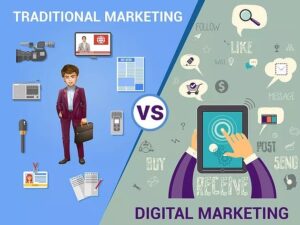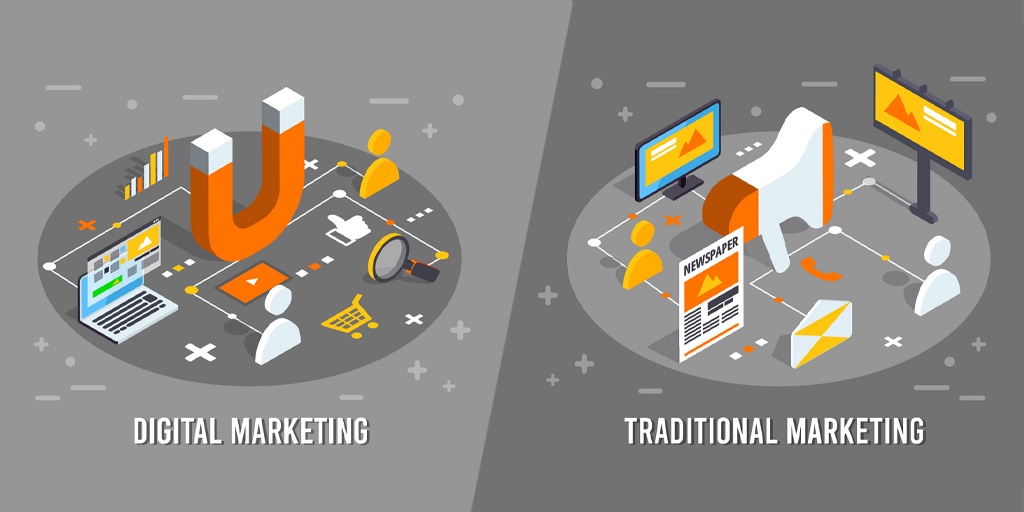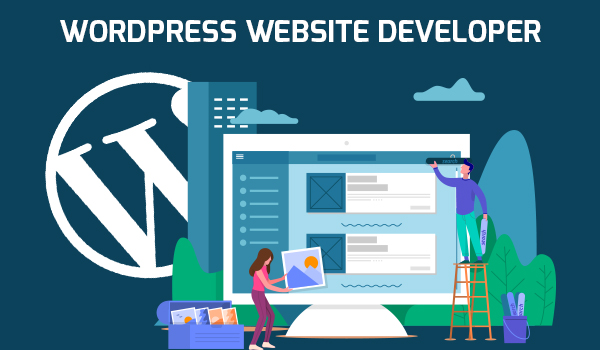The clash between Traditional and Digital Marketing methodologies is more visible than ever in today’s ever-changing marketing landscape. As a seasoned digital marketer with over a decade of experience navigating this ever-changing landscape, I’m here to shed light on the key differentiators that distinguish digital marketing from its traditional counterpart.

Reach and Targeting: The Precision of Digital Marketing
One of the key differences between digital and traditional marketing is the precision with which the desired audience can be reached and targeted. Traditional marketing channels, such as television, radio, and print, cast a wide net and provide little control over who sees the message. Digital marketing, on the other hand, uses tools such as social media ads, search engine optimization (SEO), and email campaigns to zero in on specific demographics, behaviors, and interests. This targeted approach ensures that marketing efforts are directed at those who are most likely to interact with the content.
Measurability and Analytics: Digital Marketing’s Data Advantage
When it comes to measuring the effectiveness of campaigns, digital marketing has a significant advantage. Real-time insights into user behavior, engagement, and conversion rates are provided by analytics tools. This data-driven approach allows marketers to adapt and optimize strategies on the fly, increasing ROI. Measuring the impact of a billboard or TV ad in traditional marketing requires more guesswork, making it difficult to assess the true success of a campaign.
Cost Effectiveness: Making Better Use of Digital
Traditional marketing can be costly, especially when considering expenses for TV airtime, radio spots, or print space. Digital marketing, on the other hand, provides more cost-effective solutions, making it available to companies of all sizes. Companies that use pay-per-click (PPC) advertising, for example, only pay when users interact with their ads. This level of cost control enables marketers to allocate budgets more strategically, ensuring maximum impact while avoiding waste.
Interactivity and Engagement: Relationship Building in the Digital Sphere
Interactivity and engagement are essential in digital marketing. Social media platforms, blogs, and interactive websites enable brands and their audiences to communicate in two ways. Businesses can use direct engagement to build relationships, gather feedback, and address customer concerns in real-time. Traditional marketing, with its one-way communication channels, frequently lacks this level of interaction, making genuine connections with the target audience difficult.
Global Reach: Overcoming Geographical Barriers
The digital world has no boundaries, allowing businesses to expand their reach globally. Companies can connect with audiences on a global scale through online platforms, breaking down geographical barriers that traditional marketing struggles to overcome. This increased reach opens up new opportunities for growth and market expansion, allowing businesses to enter new markets without being limited by physical location.
Adaptability and Flexibility: Managing the Tides
The inherent adaptability of digital marketing is a game changer in the fast-paced world of business. Trends, algorithms, and consumer behavior change quickly, and digital marketers must be able to pivot in real-time. Whether it’s fine-tuning a social media strategy or honing SEO tactics, digital marketing enables quick responses to market changes. Traditional marketing may struggle to keep up with the same level of agility due to longer production timelines and fixed schedules.
Conclusion:
The line between traditional and digital marketing continues to blur in the digital age, with businesses increasingly favoring the latter for its precision, measurability, and cost efficiency. Recognizing the strengths of each approach and finding a balance that aligns with the unique needs of a business, on the other hand, remains critical. As a veteran of digital marketing, I can attest to the transformative power of embracing the digital frontier while recognizing the enduring value of certain traditional marketing elements. The key is to develop a strategy that combines the best of both worlds, resulting in a comprehensive and effective approach to reaching and engaging the target audience.
Read More:- Top 8 Most Wanted Digital Marketing Skills in 2024
Read Also:- What is WordPress Hosting? Definition, Features & Benefits.
Best and reliable Hosting for your website:- Hostinger
Get Your Website Build Here:- Wpdeveloperz.com


